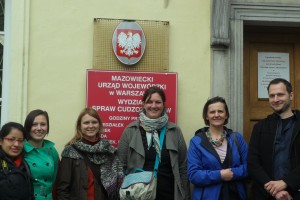The Polish meeting, deepening the topic of legalization through marriage and children left behind.
The third national event of the Grundtvig project “Advanced Training Programme on Transantional Families
Support” took place in Warsaw, Poland from the 15th to 17th of May. The main objectives of the meeting were to focus on the situation of intercultural couples and to identify the educational needs of the stakeholders working with intercultural couples. Another relevant aspect of the meeting was to present the problematic of children in migration.
Polish Migration Forum organized one day meeting at the Warsaw Municipality with public and private stakeholders involved in the transnational family: representatives of the Ministry of Foreign Affairs, Border Guards, Ministry of Interior and regional authorities in charge of legalization, Civil Registry Office, the Ombudsman, the Ombudsman for Children and NGOs. The new law on foreigners, entered into force the 1st of May 2014, was analyzed and discussed. In the morning a lively debate took place within the speakers and the participants to the meeting, some critics has been arisen by NGOs representatives on the proceedings to obtain a visa and the methods used during interviews with intercultural couples . First of all the difficulties for the international couples to enter in Polish territory were discussed, basically it was clear that there are numerous obstacles that prevent a international family to live together. Due to the new law the foreign spouses could no longer apply for the resident permit through the consulate but they need to obtain a Visa to enter in Poland.
Then Representative of the Civil Registry Office made a focus on the marriage formalities necessary to validate the marriage in Poland, he explained the difficulties they face in determining the validity of foreign documents. In this view they called for a better collaboration with the Consular Service. Finally the Mazovian Voivod and The Border Guards – actors involved in the legalization of stay - illustrated their role and their responsibilities.
During the afternoon the attention was brought towards another aspect of migration: children left behind by migrant parents. In Poland , although is one of the European country with the highest migration rates – in 2013 2, 1 million poles live abroad – no actions has been undertaken by the State Agencies and few projects were addressed towards this vulnerable group by NGOs. The only available research produced by the Ministry of Education is dated 2009 and it underlined that at least 120,000 children experienced family separation. The only activities implemented are related to the field of education, the Ministry of Education organized workshops and special trainings for teachers to empower them to deal with behavioral problems and school dropout.
In this context the psychologist Kataryn Fenik illustrated the situation of children left behind in Poland. The consequences caused by family separation were analyzed through specific case study. It was evident that children separated by their parents for temporary labor have to face a new responsibilities, they have to reconsider their role in the family. For this reason it is necessary to mitigate the effects of separation, fostering resilient process in the minors.
Then, Grundtvig partners presented their experience and work with the transnational families. In particular it was a relevant occasion to present the issues of children left behind in a comparative view towards polish institutions and no profit organizations.
Alternative Sociale presented the situation of children left behind in Romania and the legal framework for children protection. Alternative Sociale – that has been working with children left behind since 2005 – developed a methodology implemented in their projects in which they offer a psycho social support to the minors. Partner Bulgaria Foundation is developing an in depth country analysis of Bulgarian context, producing interviews and focus groups in the countryside and in the urban centers. What emerged by the research is that is it necessary to create a mechanism to identify children’s needs and, at the same time, inform parents on the legal, educative and social responsibility. Soleterre – Strategie di pace Onlus explained their methodology to support migrants family reunifications based on an integrated approach that foreseen the intervention of a psychologist, a cultural mediator and a legal. Finally Fondazione L’Albero della Vita presented their activities in favor of children left behind: implementation of projects on child protection, researches, raising awareness through the organization of round tables and advocacy activities. It was reported how the issues of children left behind has been considered within European Institutions and the European Commission political response. Furthermore, examples of financial instruments were brought to the attention with the purpose of addressing EU funds to children.
During the second day of the meeting Grundtvig Partners went to visit the Office for Foreigner – Regional Government which offers the first help to migrants. The quality of the service improved in the last years: a lot of services are available on-line, information are written in different languages and it is possible to organize interviews by appointments.
The polish national meeting was a fruitful opportunity for exchanging good practices, presenting new methodologies and fostering a discussion on different aspects of migration.


